The Voice of the Lord
For Sunday January 9, 2005
First Sunday After Epiphany
Lectionary Readings (Revised Common Lectionary, Year A)
Isaiah 42:1–9
Psalm 29
Acts 10:34–43
Matthew 3:13–17
My friend Bill recently emailed me to ask for some book recommendations. He wanted to pass on my suggestions to a former student who had nearly lost her faith, were it not for a handful of books that parsed the Christian faith in ways that resonated with her. One book in particular spoke to her so deeply that she lamented, "if I had read this book in college I would not have spent twelve years trying to be an atheist."
Catholic piety centers on the sacraments, and the Eastern Orthodox privilege icons and images, whereas Protestantism is a quintessentially book tradition. The Reformation of the 16th-century that convulsed Europe spawned a text-oriented faith that denigrated images and deemphasized the sacraments (whittling Catholicism's seven sacraments down to two). A new piety arose in which reading usurped rituals and relics. In the early years of the Reformation, Protestant extremists smashed sculptures, defaced images, and whitewashed the frescoes of churches. "Images," sniffed the Genevan Reformer John Calvin (1509–1564), "cannot stand in the place of books." The sermon upstaged the eucharist as the defining moment of the liturgy; it was spoken from an elevated pulpit, in street vernacular, and directed to a person's intellect, instead of ritual formulas intoned in Latin which no one understood. Before too long, pastors like Huldrych Zwingli (1484–1531) in Zurich and Martin Luther (1483–1546) in Wittenberg, Germany, preached their sermons wearing a radical change of dress, the scholar's gown as opposed to a monk's cowl, symbolizing this centrality of books, words, scholarship and ideas.
The invention of movable type, along with the production of paper from rags instead of animal skins or reed-based parchment, was the engine that drove the Reformation. Together, they made book production cheaper, easier, and profitable. According to the English Puritan John Foxe (1516–1587), "God conducted the Reformation not by the sword, but by printing, writing, and reading." On the title page of his book Acts and Monuments (1563), later nicknamed Foxe's Book of Martyrs, Foxe depicted two congregations at worship—Catholics fingering their rosaries, and Protestants reading books in their laps.
Luther, whose collected works run to some 60 volumes, epitomized this love affair with texts, books, and words. Between 1517 and 1520 his pamphlets sold over 300,000 copies. His phenomenal capacity to write met the voracious appetite and enthusiasm of a newly literate reading public. "There were 390 editions of various of Luther's writings published in Germany in 1523 alone," writes Diarmaid MacCulloch in his magisterial book The Reformation (2003), "and it has been calculated that beyond what he himself had written, around three million copies of related pamphlets (Flugschriften, or fly sheets, mostly illustrated) were printed in German by 1525...Print could take the Reformation to anyone who was prepared to hear a pamphlet being read out...It was a time of what the German historian Franz Lau has called Wildwuchs: wildfire growth, as in a jungle or an abandoned garden."
In books, pamphlets and tracts the early Protestants encountered what MacCulloch describes as "the explosive power of an idea" (namely, a restatement of St. Augustine's ideas about salvation). "Monarchs, priests, nuns, merchants, farmers, laborers were seized by ideas that tore through their experiences and memories and made them behave in new ways, sometimes admirable, sometimes monstrous." Protestants then and now discover what the Psalmist for this week describes as "the voice of the Lord." Sometimes this "voice of the Lord," the Psalmist writes, "thunders, breaks in pieces the cedars of Lebanon, strikes with flashes of lightening, shakes the desert, twists the oaks, and strips the forests bare" (Psalm 29). At other times "the voice of the Lord" we discover in books speaks softly and gently to encourage us.
With gratitude to those first reading Protestants, here are ten books that I read the last year in which I encountered the bark-stripping power of ideas and the tender voice of the Lord. I offer them for your own reading list in 2005.
Craig Barnes, Searching for Home; Spirituality for Restless Souls (2003): The former pastor of National Presbyterian Church in Washington, DC, elucidates the Christian pilgrimmage in terms of journeying toward home. Each chapter begins with a short quote from Dante's Inferno, Purgatory, or Paradise, and then proceeds with Barnes's theological and pastoral reflections, including his own Christian journey. Barnes does a fine job at avoiding cliches, taking the measure of contemporary culture, including a broad diversity of popular and scholarly sources, and drawing upon a fund of insights from pastoral counseling. The book moves us through the stages of Christian journey, from our profound lostness, to awakening, repentance, confession, faith, community, guidance, and sacrament. The truly good news of Jesus, writes Barnes, is that "all of the roads belong to God," and that "the Savior can use any road to bring us home." Quoting CS Lewis, he reminds us that God can even use the wrong roads to take us to the right places.
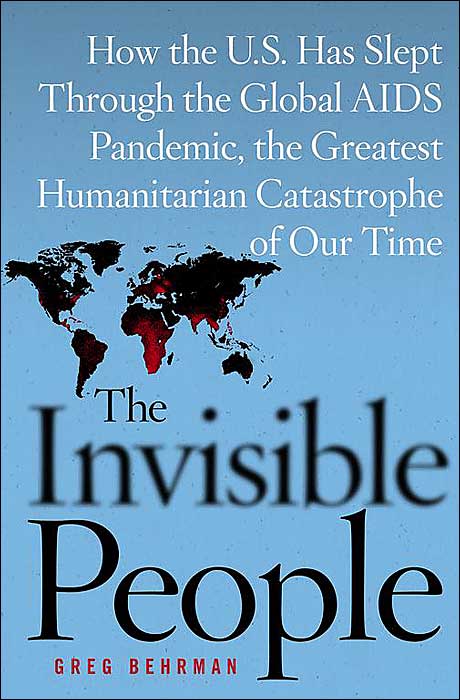 Greg Behrman, The Invisible People; How the US Has Slept Through the Global AIDS Pandemic, the Greatest Humanitarian Catastrophe of Our Time (2004): With 20 million already dead, 8,000 deaths every new day, and, the experts warn, worse yet to come, Behrman traces the history of the epidemic, responses to it, and how HIV/AIDS is a moral crisis, a humanitarian disaster, and even an issue of national security.
Greg Behrman, The Invisible People; How the US Has Slept Through the Global AIDS Pandemic, the Greatest Humanitarian Catastrophe of Our Time (2004): With 20 million already dead, 8,000 deaths every new day, and, the experts warn, worse yet to come, Behrman traces the history of the epidemic, responses to it, and how HIV/AIDS is a moral crisis, a humanitarian disaster, and even an issue of national security.
Ron Chernow, Alexander Hamilton (2004): How one single individual, from a highly improbable birth and background, shaped our entire nation's history. Chernow's magisterial biography commemorates the 200th anniversary of the death of Hamilton (1755–1804), who was killed in a duel by then vice president Aaron Burr. Because of the savage politics and pathological enmity between Hamilton and his detractors (Jefferson, Madison, Adams, and Monroe), his reputation has suffered neglect, when in fact he might have been the most important architect of our post-Revolutionary American experiment.
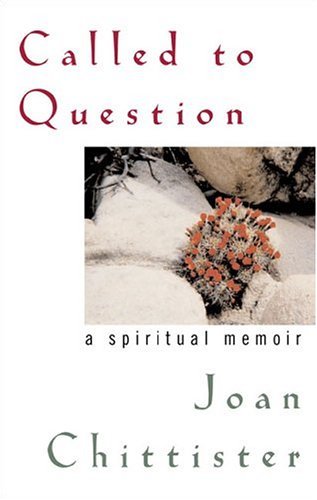 Joan Chittister, Called to Question; A Spiritual Memoir (2004): The Benedictine nun and author of 25 books names the fear of asking questions and being wrong for the unfortunate trait that it is. This is the third book by her that I have read, and I have come to appreciate her spirit and gift to do what good writers do, which is to connect with the every day experiences and aspirations of readers. Using her own spiritual journal entries from across a four year period, she pushes, pokes and prods at the various dimensions of Christian living.
Joan Chittister, Called to Question; A Spiritual Memoir (2004): The Benedictine nun and author of 25 books names the fear of asking questions and being wrong for the unfortunate trait that it is. This is the third book by her that I have read, and I have come to appreciate her spirit and gift to do what good writers do, which is to connect with the every day experiences and aspirations of readers. Using her own spiritual journal entries from across a four year period, she pushes, pokes and prods at the various dimensions of Christian living.
Philip Jenkins, The Next Christendom; The Coming of Global Christianity (2002): A little over twenty years ago David Barrett published his book World Christian Encyclopedia (1982; 2002) that documented a growing change in Christianity’s center of gravity. After flourishing around the Mediterranean perimeter, Christianity was overtaken by Islam by the eighth or ninth century. For the next millennium, Christianity migrated to Europe. Now, with Jenkins’s new book, we can say with confidence that yet another massive shift has occurred in Christianity, away from the wealthy and primarily white regions of the northern hemisphere, to the poor and non-white regions of the southern hemisphere.
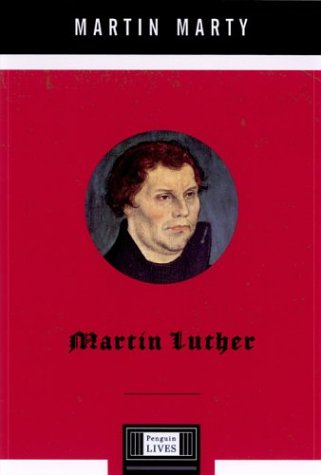 Martin Marty, Martin Luther (2004): An accessible and eminently readable biography that takes its guiding theme from Luther’s lifelong struggle with God: “God present and God absent, God too near and God too far, the God of wrath and the God of love, God weak and God almighty, God real and God as illusion, God hidden and God revealed.” The German word upon which Marty fastens this theme is Anfechtungen, a word that is hard to translate but easy for people to appreciate: “the spiritual assaults that Luther said kept people from finding certainty in a loving God.”
Martin Marty, Martin Luther (2004): An accessible and eminently readable biography that takes its guiding theme from Luther’s lifelong struggle with God: “God present and God absent, God too near and God too far, the God of wrath and the God of love, God weak and God almighty, God real and God as illusion, God hidden and God revealed.” The German word upon which Marty fastens this theme is Anfechtungen, a word that is hard to translate but easy for people to appreciate: “the spiritual assaults that Luther said kept people from finding certainty in a loving God.”
Donald McCullough, The Consolations of Imperfection; Learning to Appreciate Life’s Limitations (2004): A former pastor and seminary president who lost his marriage and his job explores the breadth and depth of life's limits. Each chapter treats a specific limit, and then shows how and why it might be construed as a blessing: the limitations of the body, relationships, knowledge, achievement, moral goodness, spirituality, romance, sex, confidence, public approval, money, competitiveness, control, freedom, pleasure, the senses, time and optimism.
Brian McLaren, A Generous Orthodoxy (2004): The subtitle explains the entire book, "Why I am a missional + evangelical + post/protestant + liberal/conservative + mystical/poetic + biblical + charismatic/contemplative + fundamentalist/calvinist + anabaptist/anglican + methodist + catholic + green + incarnational + depressed-yet-hopeful + emergent + unfinished CHRISTIAN."
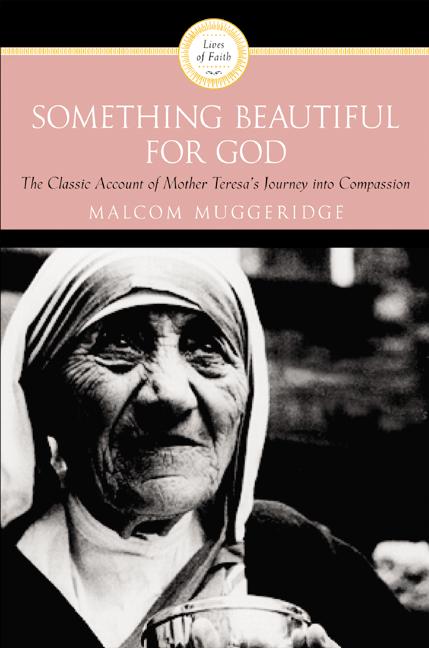 Malcolm Muggeridge, Something Beautiful for God; The Classic Account of Mother Teresa's Journey Into Compassion (1971): Late in his adult life the renowned agnostic Muggeridge converted to Christianity through the influence of Mother Teresa (1910–1997). In 1959 he interviewed Mother Teresa, and then ten years later made a television documentary of her life for the BBC. To honor her beatification in October 2003, Harper reissued the book version of these two efforts as a short, popular biography.
Malcolm Muggeridge, Something Beautiful for God; The Classic Account of Mother Teresa's Journey Into Compassion (1971): Late in his adult life the renowned agnostic Muggeridge converted to Christianity through the influence of Mother Teresa (1910–1997). In 1959 he interviewed Mother Teresa, and then ten years later made a television documentary of her life for the BBC. To honor her beatification in October 2003, Harper reissued the book version of these two efforts as a short, popular biography.
David Shipler, The Working Poor; Invisible in America (2004): Pulitzer Prize winner Shipler has written a passionate book about the poor. One measure of a society, and certainly of Christianity, is its care for the weak, the vulnerable and the poor. Shipler focuses on a special sort of poor, not the destitute but what he calls the “working poor.” These are the people we pass every day who make our American way of life possible. They clean our office buildings at night, serve us at restaurants, repair our cars, sew our designer garments, and handpick our fresh produce. Two other favorite books by Shipler include Arab and Jew; Wounded Spirits in a Promise Land and A Country of Strangers; Blacks and Whites in America.
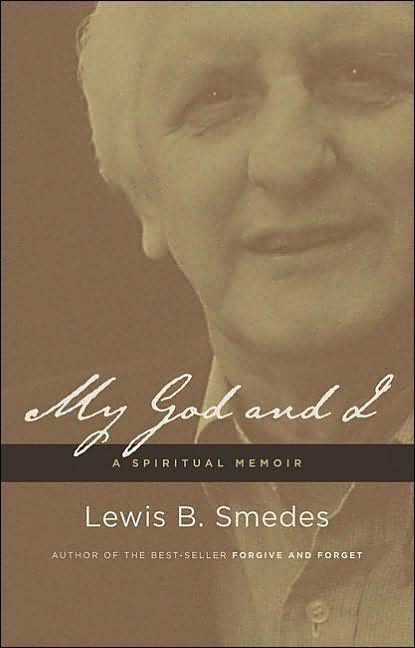 Lewis B. Smedes, My God and I; A Spiritual Memoir (2003): Smedes, long time and much loved professor of Fuller Theological Seminary, finished this short memoir just before his untimely death on December 19, 2002, at the age of 81. Thank God he did. In twenty-seven short, crisp chapters (about 7–8 pages each), Smedes takes us through the successive stages of his life journey, beginning with his grandparents and ending with his retirement years. Smedes struggled with faith. He reminds me of the wag who observed, “my faith does not seem to be very strong, but it appears to be permanent.”
Lewis B. Smedes, My God and I; A Spiritual Memoir (2003): Smedes, long time and much loved professor of Fuller Theological Seminary, finished this short memoir just before his untimely death on December 19, 2002, at the age of 81. Thank God he did. In twenty-seven short, crisp chapters (about 7–8 pages each), Smedes takes us through the successive stages of his life journey, beginning with his grandparents and ending with his retirement years. Smedes struggled with faith. He reminds me of the wag who observed, “my faith does not seem to be very strong, but it appears to be permanent.”
Make that eleven. May you too hear the voice of the Lord from the printed page, whether a thunder that splits the oaks or the tender whisper of encouragement.





